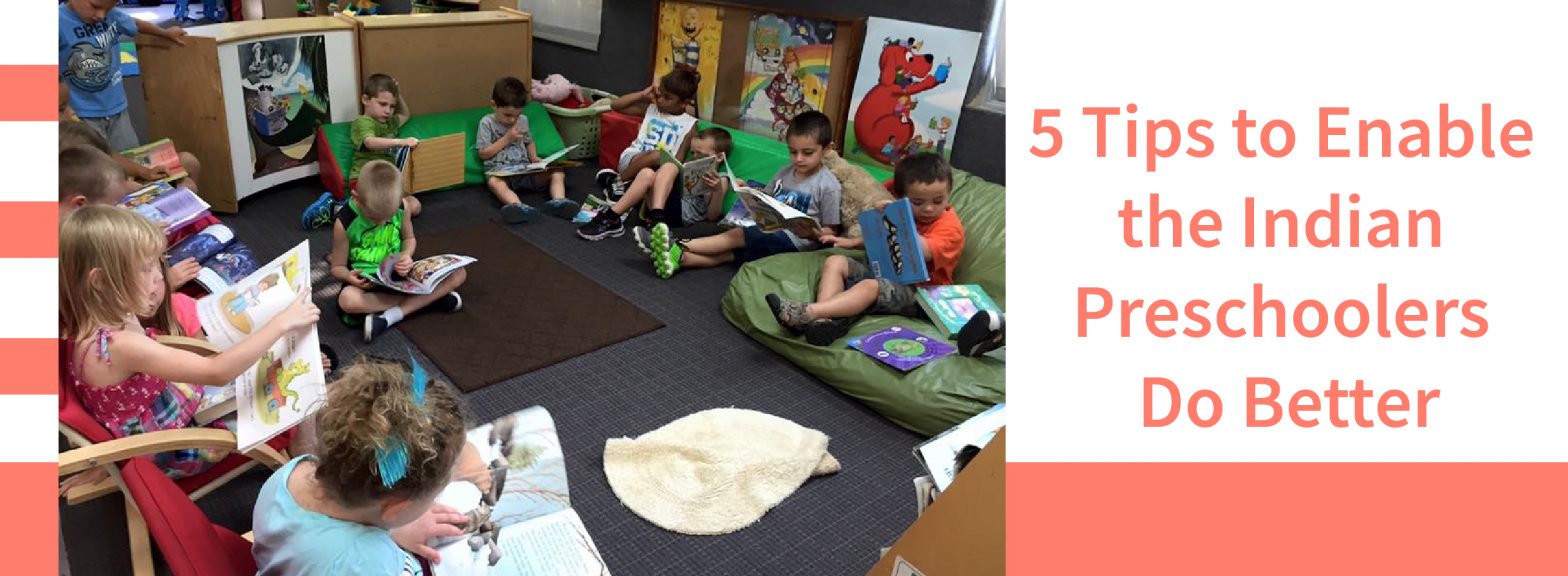
5 Tips to Enable the Indian Preschoolers Do Better
When the soil is moist and mild, you can give it any shape you want; but when it becomes hard you have least options to change it. The same thing is also applicable and viable here in preschoolers as the kids’ minds are softer and more perceptive in this age to reshape themselves by learning and adopting anything that pertains to their interest. But it’s feasible only if it is based on hands-on learning. Constant reading and writing based on traditional process develop monotony and it is but natural for anybody, especially the children to become monotonous while carrying on the same pattern of learning by keeping themselves adhered to their textbooks all the times. More often than not, such pressure and mode of learning bring adverse results for preschoolers.
Preschool is the first place in children’s life where they are sent away from parental care and dotting. Here, they learn to explore their senses, interact with peers, and start gaining valuable lessons of life. Thus, preschools play a key role in early childhood development and help students lay the founding stone of their career that enables them to succeed in every exam for the rest of their lives.
It is often found and time-to-time surveys also corroborate this fact that children learn faster and better when they do anything themselves by handling the tools they are provided with. Sometimes, they make a great accomplishment which they could have hardly expected of. So better let the children apply their I.Q. not only in learning but also in using the things. Tinkering Lab or Atal Tinkering Lab, a scheme of NITI Ayog initiated by the Government of India is a great initiative in this sphere where children are given the chance to learn through tinkering with tools rather than keeping themselves stick to a strictly traditional process.
Today, new-age preschools are well aware of the growing needs of young learners and are in the process of transforming education through innovation to ensure that a holistic improvement will be seen among tiny tots. Pursuant to all these crucial aspects, here are a few activities that preschools in India can bring into effect to make the overall learning and development of their wards distinctly better.
Using play-activity boxes in teaching
In addition to toys, the preschool children must be provided with educational activity boxes to play. These will help them create new things, explore different ways of solutions to challenges, and learn their lessons by performing the tasks they are assigned or taken over willingly. Exclusively designed to enrich and kindle young minds, this form of unstructured play and experiential learning promote early child development in a fund and engaging manner.
Teaching through an external ambiance
Children shouldn’t be kept confined within the four walls of their classrooms. It must be associated with the real world in a way that allows them to understand their lessons well. Instilling real-world learning or organising field trips for lessons associated with nature can ignite the students’ interest and make them more involved in their educational efforts.
Developing Emotional Quotient equally important to Intelligence Quotient
Emotional Quotient (EQ) is the ability to identify, understand, and manage emotions. As the studies say, poor EQ skills may result adversely in development of aggressions, worries, depression, modest academic performance, and so on. Hence, when teachers take lessons to build IQ, they should also respond with sufficient importance to developing EQ, as it helps the children manage their emotions and improves academic outcomes, while mitigating worries and behavioural issues.
Do It Yourself (DIYs) for children
From making paper flowers to turning fused bulbs into flower pots or bottles into toy-cars, and so on, children must be given the opportunity to display their creativities. They should be provided with simple raw materials and asked to make something from it. DIYs are a great initiative to inspire the children and keep them in the process of applying their mind. Moreover, DIYs also assist them in effectuating the holistic growth and development of these skilfully honed kids.
Playing a Role
Playing a role is proved an immensely effective and stimulating activity for children. It encourages them to learn, improve focusing on subject, and develop imagination among them. Kids are able to learn various skills and express themselves better while playing a role. It helps them act the role of fictional characters and perform according to the essences which they observe and understand. In fact, playing a role is fun adopted to teach the children about situations, seasonal events, and occupations etc. that arise and take place in human life.
